Brontothere
From Halopedia, the Halo wiki
- "How Riser's people would love to hunt you."
- — The Librarian thought of the diminutive florians when she laid eyes on a brontothere.[1]
Brontotheres,[1] known to the Forerunners as kaimistro, and colloquially known as rhinok,[2][Note 1] are interplanetary rhinoceros-like creatures originally native to Earth.[1] In the modern era, brontotheres can found across several Forerunner installations.[2][3]
Overview[edit]
Biology and physiology[edit]
Large, rhinoceros-like creatures, brontotheres feature bifurcated horns and rows of osteoderms which run up their snouts, over their shoulders, and ending on their backs.[2] They are known to reach heights of at least two meters.[1] They possess extremely complicated body chemistry, and evidence exists that their chirality can be easily swapped between individual generations. The Forerunners modified the brontotheres' intestinal flora to operate in conjunction with environmental nanomachines to function as bioreactors for various useful compounds.[2]
Behavior[edit]
Brontotheres are generally bad-tempered herbivores which feed on grasses and woody foliage, and are in turn prey to carnivores both larger and smaller than them.[2][3] On one occasion, a pack of morolaath were observed hunting a herd of brontotheres.[3] The brontotheres found on Earth during the time of the Erde-Tyrene civilization were believed to fear humans,[1] implying that humans hunted the creatures. Sentinels of some Forerunner installations will monitor and shepherd brontotheres herds as they traverse their migratory patterns, regardless of unexpected environmental changes.[2]
Habitat[edit]
Native to Earth, brontotheres could be found in east Africa in 97,445 BCE, living among other animals such as gazelle, wildebeest, buffalo, and ibexes.[1] Following their indexing by the Forerunners,[2] brontotheres in the modern era can be found in a variety of biomes, including desert-like regions.[3] While their diet would encourage them to seek out grasslands, brontotheres were known to migrate.[2]
History[edit]
Distant past[edit]
- "A two-meter high brontothere nuzzles my hand, gentle but forceful, telling me I am out of place, perhaps I should move off somewhere and not bother this peaceable realm."
- — The Librarian shares her thoughts with a Catalog unit.[1]
Brontotheres were among the creatures that were preserved as part of the Librarian's Conservation Measure.[1][2][4] In 97,445 BCE during the Librarian's last days on Earth before the firing of the Halo Array, a two-meter-tall brontothere was one of several animals that approached her, nuzzling her hand. She surmised that they no longer had any fear since all the humans had been removed.[1]
Conservation[edit]
Among the myriad life forms indexed by the Forerunners, brontotheres can be found on several installations,[2] including at least one Halo installation.[3] On one occasion, a herd of brontothere on a Halo installation were witnessed by OQ-45 Honeybee drones being hunted by a pack of morolaath. Footage of the event was broadcast to Earth for viewing by civilians attending an Outpost Discovery event.[3][5][Note 2]
Non-canon and dubious canon appearances[edit]
Silver Timeline[edit]
- Main article: Silver Timeline
While on Reach in 2552, Spartan-IIs Louis-036 and Riz-028 watched a documentary concerning the lifecycle of brontotheres.[6]
Production notes[edit]
- Outside of the Halo universe, brontotheres are believed to have gone extinct around 33.9 million years ago, as opposed to still existing on Earth just around 100,000 years ago.
- Brontotheres were modeled for Halo Infinite's announcement trailer at E3 2018.[7] During the trailer's production, they were internally referred to as "space rhinos" by members of 343 Industries.[8] They were ultimately cut from the final game, but were later identified as kaimistro and rhinok in the Halo Encyclopedia (2022 edition).[2]
- In Halo: The Television Series Season Two episode Sword, a documentary concerning the "Lifecycle of the Brontothere" appears using footage the kaimistro from Halo Infinite's announcement trailer.[6] Though the kaimistro had already shared many similarities with real-world brontotheres, this was the first direct indication that the brontothere originally seen in Halo: Silentium and the kaimistro were officially considered to be the same creature.
Gallery[edit]
Development images[edit]
Concept art of the brontothere.[8]
Concept art of a juvenile brontothere.[8]
References used for the modeling of brontothere.[8]
Behind-the-scenes image of a brontothere from the making of the Halo Infinite's announcement trailer.[8]
3D models used in Halo Infinite's announcement trailer.[8]
Behind-the-scenes image of brontotheres from the making of the Halo Infinite's announcement trailer.[8]
Behind-the-scenes images of brontotheres from the making of the Halo Infinite's announcement trailer.[8]
Renders[edit]
Screenshots[edit]
Detailed view of a brontothere nostril in the Halo Infinite's announcement trailer.[7]
A brontothere begins to rise from bedding down in the grass in the Halo Infinite's announcement trailer.[7]
A herd of twenty-sixth century brontothere in the Halo Infinite's announcement trailer.[7]
A herd of brontothere on a Halo ring in the Halo Infinite's announcement trailer.[7]
List of appearances[edit]
- Halo: Silentium (First appearance)
- Halo: Outpost Discovery
- Halo: The Television Series Season Two
Notes[edit]
- ^ This article infers that—barring evidence to the contrary—brontothere, kaimistro, and rhinok are synonymous terms. The 2022 Halo Encyclopedia establishes the connection between kaimistro and rhinok, implying that they are synonymous terms. However, the phrase "kaimistro rhinok" in the animal's entry could be read to imply that kaimistro is a certain species of rhinok, making rhinok a more general term comparable to the real-world "brontothere," which is actually a family of similar species rather than one singular species. Ultimately, this article infers that kaimistro and rhinok are synonymous terms just as the other animals detailed alongside it in the encyclopedia each feature two synonymous terms (rangmejo and quadwing, chaefka and tusk beast, etc.). The connection between kaimistro/rhinok and brontothere lies in the animal's similarities to real-world brontotheres, the Forerunners' known involvement with both brontotheres and kaimistro, and Halo: The Television Series Season Two episode Sword in which a documentary using footage of kaimistro refers to the animals as brontotheres. It should be noted that while the television series is part of the Silver Timeline, names have remained consistent between it and the main Halo universe, supporting the inference that brontothere, kaimistro, and rhinok are synonymous terms.
- ^ Halo: Outpost Discovery, a traveling experience canonically set at some point between 2554 and 2557, includes an attraction called "The Ring Experience" which involves viewing a live feed from a OQ-45 Honeybee drone exploring a Halo ring. Multiple brontotheres can be seen being chased by morolaath in the environment. The planet which the ring is shown orbiting discounts the possibility that it could be Delta or Gamma Halo, and executive producer of The Ring Experience, Jason Ambler, believes it is supposed to be Zeta Halo. If this is the case, the experience cannot be set any earlier than the point in 2555 when the exploration of that installation began. 000 Tragic Solitude's claim in Halo: Hunters in the Dark that morolaath had not been encountered by humans for some time would also suggest they had not been seen elsewhere before those who traveled to the Ark ran into some. Officially, the identity of the installation shown in The Ring Experience is presently undefined by 343 Industries. It should also be noted that the canonical dating of Outpost Discovery may be able to be further narrowed by a display which claims it is believed 343 Guilty Spark was destroyed in 2552. It was in late 2555 that the UNSC first learned of this monitor's survival, as established in Chapter 13 of Halo: Renegades. However, it is very possible that the UNSC would have kept this information from the general public.
Sources[edit]
- ^ a b c d e f g h i Halo: Silentium, String 37
- ^ a b c d e f g h i j k Halo Encyclopedia (2022 edition), page 362
- ^ a b c d e f Halo: Outpost Discovery, The Ring Experience
- ^ Halo: Silentium, String 2
- ^ Halo: Outpost Discovery, The Making of The Ring Experience
- ^ a b Halo: The Television Series, episode Sword
- ^ a b c d e Halo Infinite marketing, Halo Infinite announcement trailer
- ^ a b c d e f g h YouTube - Halo, The Making of the Halo Infinite Announce Trailer
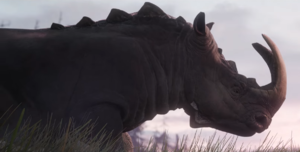
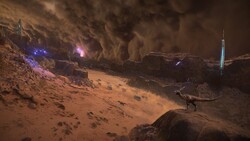


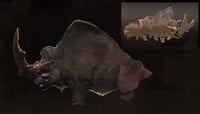
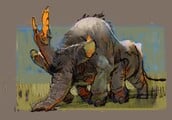
![Concept art of the brontothere.[8]](https://halo.wiki.gallery/images/thumb/c/cb/HINF_Rhino_Concept.png/200px-HINF_Rhino_Concept.png)
![Concept art of a juvenile brontothere.[8]](https://halo.wiki.gallery/images/thumb/8/89/HINF_Rhino_Juvenile_Concept.png/200px-HINF_Rhino_Juvenile_Concept.png)

![References used for the modeling of brontothere.[8]](https://halo.wiki.gallery/images/thumb/6/6a/Rhinoreferences.PNG/162px-Rhinoreferences.PNG)
![Behind-the-scenes image of a brontothere from the making of the Halo Infinite's announcement trailer.[8]](https://halo.wiki.gallery/images/thumb/4/4e/SpaceRhino1.PNG/114px-SpaceRhino1.PNG)
![3D models used in Halo Infinite's announcement trailer.[8]](https://halo.wiki.gallery/images/thumb/b/b7/SpaceRhino5.jpg/200px-SpaceRhino5.jpg)
![Behind-the-scenes image of brontotheres from the making of the Halo Infinite's announcement trailer.[8]](https://halo.wiki.gallery/images/thumb/2/24/SpaceRhino2.PNG/200px-SpaceRhino2.PNG)
![Behind-the-scenes images of brontotheres from the making of the Halo Infinite's announcement trailer.[8]](https://halo.wiki.gallery/images/thumb/6/66/SpaceRhino3.PNG/200px-SpaceRhino3.PNG)
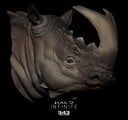
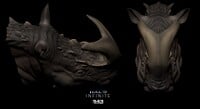
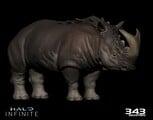
![Detailed view of a brontothere nostril in the Halo Infinite's announcement trailer.[7]](https://halo.wiki.gallery/images/thumb/c/ca/Brontothere1.png/200px-Brontothere1.png)
![A brontothere begins to rise from bedding down in the grass in the Halo Infinite's announcement trailer.[7]](https://halo.wiki.gallery/images/thumb/1/1b/Brontothere2.png/200px-Brontothere2.png)
![A herd of twenty-sixth century brontothere in the Halo Infinite's announcement trailer.[7]](https://halo.wiki.gallery/images/thumb/3/3d/Brontothere4.png/200px-Brontothere4.png)
![A herd of brontothere on a Halo ring in the Halo Infinite's announcement trailer.[7]](https://halo.wiki.gallery/images/thumb/c/c3/Brontothere5.png/200px-Brontothere5.png)